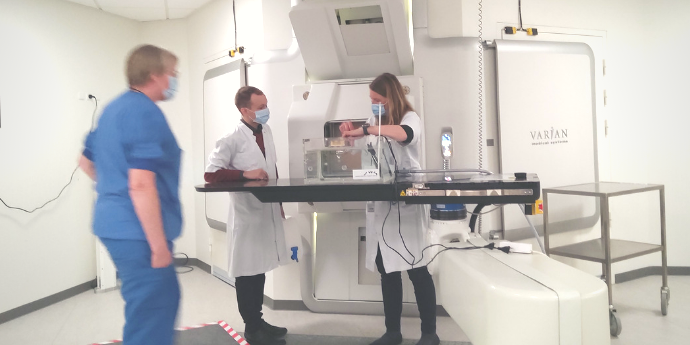
Brita Singers Sørensen (on the right) and colleauges in the experimental room at the Danish Centre for Particle Therapy.
20.05.2021
A grant from Independent Research Fund Denmark ensures further Danish research in FLASH therapy, where treatment is delivered at ultra-high dose rates about 1,000 times faster than conventional radiotherapy. Professor Brita Singers Sørensen is a driving force in FLASH research at the Danish Centre for Particle Therapy, that provides the essential experimental facilities.
FLASH is a novel radiotherapy modality, where treatment is delivered at ultra-high dose rates in the fraction of a second. Initial studies have shown remarkable results in sparing of normal tissue and at the same time with equivalent tumour response compared to conventional radiotherapy doses.
Brita Singers Sørensen has been leading the biological research in FLASH with the aim of documenting the effect on normal tissue and cancer cells. The hope is that FLASH can significantly reduce side effects for patients in the future. More preclinical data is needed to ensure a safe transition to using FLASH therapy in the clinic.
Proton therapy is the most promising modality for clinical use of FLASH, and Professor Brita Singers Sørensen now receives the grant from Independent Research Fund Denmark to carry the preclinical experimental research at the Danish Centre for Particle Therapy (DCPT) further.
- With this funding, we now have possibilities for further exploring which parameters influence the effect of FLASH proton therapy in normal tissue, says Brita Singers Sørensen.
Paving the way for clinical research
The clinical potential of FLASH is highly promising. But many aspects are yet to be clarified in a complex technical setup involving many interdisciplinary factors. The project will supply more preclinical data on how proton FLASH therapy can be combined with the two most well-established approaches for healthy tissue radioprotection: Fractionation of the delivered dose and superior shaping of the dose distribution to the tumour.
- The biological data coming from this project is part of the foundation needed for clinical translation, explains Brita Singers Sørensen.
The international project assessment of Independent Research Fund Denmark highlighted the importance of the multidisciplinary research team and that the project has substantial translational potential.
The project is part of a broad experimental particle therapy research programme at DCPT, supported by the Novo Nordisk Foundation, where a team of radiobiologists, physicists and oncologists work together. DCPT and Aarhus University is also part of the European proton therapy network INSPIRE that allows researchers from across Europe access to experimental facilities, providing both infrastructure and scientific, administrative and technical support.
- The experimental research on FLASH, headed by Professor Sørensen and her team, is groundbreaking. If successful, it is highly likely that FLASH therapy can become a clinical reality within a few years – resulting in more cancer patients cured with less side effects, says professor and Head of Research at DCPT, Cai Grau.
Collaborating researchers
Facts
- Independent Research Fund Denmark (Danmarks Frie Forskningsfond) funds specific research activities within all scientific areas that are based on the researchers' own initiatives and that improve the quality and internationalisation of Danish research
- The grant awarded is 2.771.525 DKK